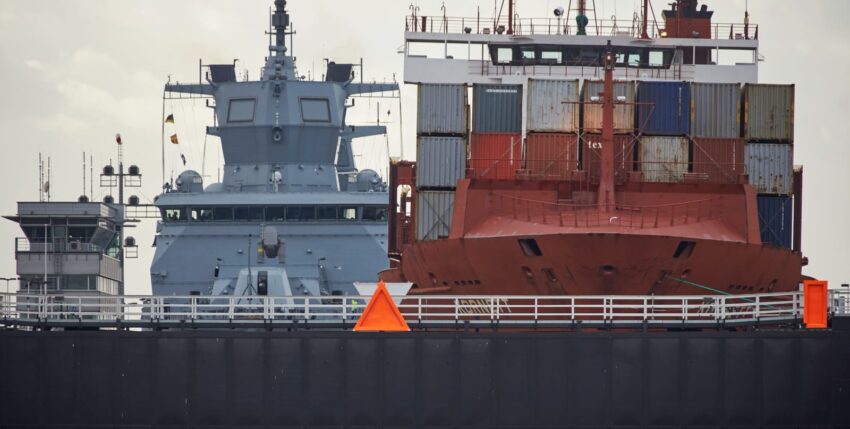In spring, it was time again for the annual report of the Parliamentary Commissioner for the Armed Forces to provide the interested community with reading material and many new and old insights into the operational readiness of the German armed forces. Armed Forces. In the 04-2021 issue of Marineforum, we read about the findings of the Parliamentary Commissioner for the Armed Forces Eva Högl for the reporting year 2020 with a view of the German Navy:
In the navy, the current operational load with only a few units leads to disproportionate wear and tear. New units must therefore be commissioned on time and repairs must be streamlined. For example, the Spessart fuel supplier was unable to take part in the Standing NATO Maritime Group because repairs were delayed. The submarines spend too long in the shipyard. Adequate repair capacities in cooperation with industrial providers and the re-establishment of support facilities for the naval arsenal are required.
This is a condensed version and cannot adequately reflect the sweat and toil of the people who work on the operational readiness of ships and crews every day in all departments of the Navy and civilian agencies - another piece in the mosaic of the limited operational and material readiness of the Bundeswehr and the German Navy in particular. You can take almost any annual report from the defence commissioners of the last few years from the shelf and you will most likely find a variation of the facts described there, as shown here as an example from the Report of the Parliamentary Commissioner for the Armed Forces Hans-Peter Bartels from 2019:
The realisation of material maintenance projects for ships and boats to maintain operational capability is currently on a critical path. On the one hand, some shipyard layovers cannot be started as planned because the personnel resources of the naval arsenal (which is part of the Bundeswehr's armaments division) are inadequate. On the other hand, lay times in the shipyards are sometimes considerably longer. Typically, a large amount of damage, for example massive rusting, is only recognisable during the shipyard laytime. In addition, the lack of spare parts, but also deficiencies in the planning of repairs by the shipyards and other contractors as well as inadequate construction supervision by the Bundeswehr lead to further disruptions in order processing.
Let's consider a cross-check: what do our readers think would happen to a commercial shipping company if its merchant fleet were to experience this and be noticeably deprived of its intended purpose for years?
Let's not misunderstand each other: The picture is complex and cannot be explained by the dysfunctionality of a single department, office or organisation. The problem has been fundamentally recognised, countermeasures have been and are being taken and the process is constantly being scrutinised. And yet here we are.
If you talk to the people who are part of this system or at least dependent on it, certain patterns become apparent for which Armed Forces and the civilian bodies that support them are probably more vulnerable than other governmental or official areas due to their hierarchical organisation.
Over time, despite centralised control from above, an ecosystem with different areas of responsibility emerges in which a mentality develops in which people prefer to retreat to regulations instead of using existing discretionary powers - this also limits their sovereignty over their own regulations over time. At the same time, the "sovereignty" of one's own sphere of influence is closely guarded and compromises are seen as a zero-sum game in which one must not lose even the smallest metre of ground. Staff councils and equal opportunities officers also need to be involved on a regular basis. At the end of the day, everyone has always done everything right, the balance within the decision-making ecosystem has been maintained - but who has actually been helped? If, at the end of the day, the unity of the departments concerned - but not the solution to a problem - is on the credit side, this is de facto organised irresponsibility.
Part of the truth is that parts of the AIN organisational unit and its subordinate departments have become "reform-weary" after years of adjustments and restructuring. But is what has been achieved enough and is there enough time for a "breather"? Even with a view to the federal elections in September this year, the signs are more in favour of change than persistence in the status quo.
Does this phenomenon sound familiar to you? Parallels with the general state of the Federal Republic of Germany are not coincidental. Apparently, people could afford the conditions; in times of crisis, however, deficits are ruthlessly exposed. We read online at the Neue Züricher Zeitung in the article "The failure of the coronavirus administrators: Germany is suffocating under its bureaucracy":
But the personalised criticism does not explain the deeper, genuinely German problem. In this week's "Die Zeit", four authors attempted an alternative explanation. The reason for the growing doubts about state efficiency is "something bigger, systemic", they explained, describing it as a "diffusion of responsibilities" between the federal and state governments. If everyone is responsible, then no one is entirely.
[...] The real reason for Germany's failure in the crisis is a peculiarity that permeates all political levels of the country and has done so for a long time: it is the desire for bureaucracy. Before the pandemic, it was a source of jokes, advice texts and YouTube videos, especially abroad. Now, during the crisis, its destructive nature is becoming apparent.
[...] In recent years, it has often been said that Germany's reputation has suffered: due to faltering digitalisation, the many wireless gaps, overpriced and faulty major construction sites, unreliable railways, dilapidated infrastructure and so on. It seemed that the "made in Germany" seal of quality had lost its value. On closer inspection, however, it is not the makers who are failing, it is the administrators. [...] It is the German state that is damaging the country's reputation: instead of clearing problems out of the way, it sets up regulations that themselves become a problem. Made in Germany? Everything the state touches is "late in Germany".
So why should the German Navy be better off than the rest of the country? Let us remind ourselves at this point that regulations do not fall from the sky without motivation but are man-made and can be adapted or even withdrawn. Who or what is actually preventing the armed forces from demanding and implementing sensible exceptions to regulations where this can be justified for military use? And where civilian regulations are being replaced, from tightening their own rules in anticipatory obedience more tightly than was actually intended in the civilian version. One example, representative of many others, is the handling of the EU Working Time Directive, which is causing a great deal of frustration among units and crews, particularly in the navy. In addition to a lack of self-confidence in their own military needs, it is the non-use of existing privileges and exemptions that paralyses.








One Response
As far as the example of the EU Working Time Directive is concerned, it would be very instructive to see how the navies of other EU countries deal with it. A direct comparison might reveal specific German peculiarities.